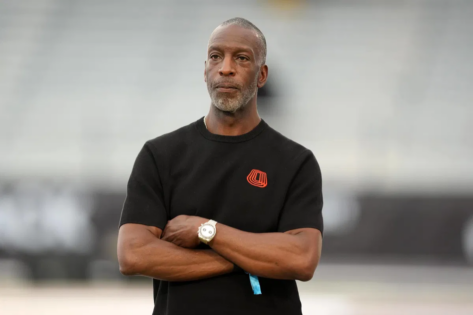“We all knew that when we found out, and it’s why we ended up, you know, certainly I can speak for myself why it’s like, okay, for a week I’m not sleeping because I know that we’ve got to get this right. I know we have to turn this around. I know we’ve got a hard road ahead now,” said Michael Johnson in one episode of Ready Set Go, while informing viewers of how their $30 million dreams were crushed. What went down?
Grand Slam Track launched with $30 million in investor commitments, faced a severe financial crisis when a major investor withdrew their promised funds after the inaugural meet in Kingston, Jamaica. This led to a $13 million debt, with athletes owed approximately $3 million in prize money from the Kingston event alone. The investor attended GST’s debut in Kingston and then reversed course, citing economic instability following a surprise tariff announcement by President Trump, diverting their funds elsewhere.
But what if Johnson had that $30 million? What if the LA Slam had never been cancelled? What if the athletes were paid on time? Would that have saved track and field? Well, this track and field coach disagrees.
Addressing the hate towards Grand Slam Track, track and field pundit, Coach Rob shared in his YouTube video that he was there to talk about how GST is no longer just an idea but a reality, and whether it will happen again. He pointed out, “Because track and field, and he (Michael Johnson) addressed this on the show, the sport itself has been in some form of crisis. Like I think it was Justin Gatlin who said it himself, that we all know that track and field as a sport needs a facelift. Noah Lyles said the sport doesn’t need to be saved, but we do need help.”
Gatlin has been vocal about track and field again and again over the years.
“We have a lot of people who believe that the sport needs saving, and it doesn’t so much need saving as much as it needs help,” Noah Lyles had said in an interview. Rob then went ahead to defend Johnson. “Michael Johnson dared to change the narrative. He invested real money, his own money, because people who call what his league has become ‘grand scam track.’ Like, it might sound cute and it might even make for a good thumbnail, but it’s just not accurate.”
Addressing the scam allegation, Johnson had said he was an investor in GST, putting in his own money, joking that this made him “the worst scammer ever.”
Credits: IMAGO
Even the track and field pundit said, “If he was a scam artist, scam artists do not set themselves up for failure.” He then stressed the two track and field legends’ conversation about how much money it takes to put on these events.
Rob talked about the prize money GST was offering, an amount that had never been offered in track and field ever. He added venue and broadcast costs to it and declared, “When you add up all the money, you do realize that $30 million does sound about right for what it was going to take to get them through a year. And $30 million does sound like $30 million.” And then he got to the part where he said that the $30 million might have also made no difference.
“But at the end of the day, Grand Slam Track is actually not in the track and field business. They are in the entertainment business. And that’s where track and field has struggled because nothing that we actually do in the sport functions as viable entertainment. Not only did it not function that way, it was never set up to be that.”
Johnson had mentioned in the past that the goal of the GST was to build a truly professional, commercially viable league for fans and top athletes, treating athletes as the product but packaging them in a way that entertains fans, just like every other professional sport, unlike track and field in its current form.
But why wouldn’t it work as entertainment? Because, like he said in his video, “races really don’t have much consequence. I mean, yes, there will be winners and losers, but who cares? Because it’s all about championships anyway.”
In high school and college, the focus is on major championships, while other races are seen as practice. At the pro level, only the World Championships and Olympics matter, with Americans reaching them solely through national trials.
Michael Johnson recalls his track saviour remark
The American track and field legend walked straight into fire when he said, “I think I can save track, I don’t think I can save track and field.” Olympic Champion Tara Davis-Woodhall simply put it out that the Field “does not need saving at all”. Months have passed ever since, but has Johnson’s stance changed? No.
In the July 31 episode of Justin Gatlin’s Ready Set Go podcast, Michael Johnson addressed the controversy surrounding his statement. Gatlin posed a direct question about Johnson’s bold claim, and Johnson responded candidly: “People ask questions, and they don’t know the question that was asked to you. They understand your answer only.” He clarified that the original question was focused on whether he could save the entire sport. His answer? Honest and precise: track, not track and field.
In the conversation with Justin Gatlin, he repeated the statement and said, “Look, I’m in the public eye. I have been for a very long time.If people want to say that I said I feel like I can be the savior, I mean, okay. I put myself out there. I have to take it, and I’ll take it.” What are your thoughts about this? Let us know in the comments.
The post Michael Johnson’s $30 Million Was Not Enough to Keep Grand Slam Track Alive, Says Track and Field Coach appeared first on EssentiallySports.
